
Journal Asiatique
Scope & Guideline
Navigating the Intersections of Culture, Language, and History
Introduction
Aims and Scopes
- Linguistic Studies:
The journal frequently publishes research on the languages of Asia, including philological studies and typological surveys, reflecting a strong focus on the structural and historical aspects of Asian languages. - Cultural History:
Papers often explore historical narratives, cultural exchanges, and the evolution of societies across Asia, providing insights into the complexities of Asian cultural identities. - Archaeological and Antiquities Research:
The journal includes studies on archaeological findings, artifacts, and historical texts, contributing to a deeper understanding of the material culture of Asian civilizations. - Interdisciplinary Approaches:
By integrating perspectives from anthropology, history, linguistics, and religious studies, the Journal Asiatique promotes a holistic understanding of Asia's diverse heritage. - Ethnohistorical Studies:
Research often delves into the historical interactions of various ethnic groups within Asia, highlighting the socio-political dynamics and cultural exchanges that have shaped the region.
Trending and Emerging
- Cultural Heritage and Preservation:
Recent publications emphasize the importance of cultural heritage, including discussions on preservation practices and the role of heritage in contemporary society. - Interdisciplinary Studies on Ethnicity:
There is a growing trend towards examining ethnic identities and dynamics within Asian societies, highlighting the complexities of cultural interactions and historical narratives. - Modern Linguistic Analysis:
The journal is increasingly featuring research that utilizes modern linguistic methodologies to analyze Asian languages, indicating a shift towards contemporary linguistic theories. - Digital Humanities in Asian Studies:
Emerging themes include the application of digital tools and methodologies in the study of Asian texts and cultures, reflecting a broader trend in academia towards digital scholarship. - Environmental and Ecological Studies:
An increased focus on environmental issues and ecological perspectives in Asian contexts is becoming evident, addressing the intersection of culture, society, and environmental challenges.
Declining or Waning
- Classical Texts and Literature:
The focus on classic literature and texts seems to be waning, as fewer papers are dedicated to traditional literary analysis compared to previous years. - Medieval Studies:
Research pertaining to medieval Asian history and literature has seen a decline, possibly indicating a shift towards modern and contemporary issues in Asian studies. - Islamic Studies:
Although still present, the volume of papers specifically addressing Islamic historical narratives and texts appears to have decreased, suggesting a narrowing of focus in this area. - Colonial Studies:
The exploration of colonial impacts on Asian societies, which was once a significant theme, is becoming less frequent, indicating a potential shift towards post-colonial or contemporary perspectives. - Traditional Medicine and Practices:
Studies on traditional medical practices and ethnobotany have been less prominent, suggesting a waning interest in these areas within the journal's scope.
Similar Journals
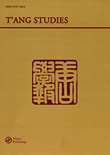
Tang Studies
Advancing Scholarship on a Pivotal EraTang Studies, published by Johns Hopkins University Press, is a pivotal academic journal that delves into the cultural and historical contexts of the Tang dynasty, spanning significant years of research and contributions in the field. With an ISSN of 0737-5034 and an E-ISSN of 1759-7633, it serves as a vital resource for scholars and students alike, offering a wealth of peer-reviewed articles that illuminate the intricacies of Tang-era society, politics, art, and literature. Recognized in the Scopus rankings with a Q3 quartile in both Cultural Studies and History, this journal stands at the confluence of rigorous academic inquiry and cultural exploration. While it is not an open-access publication, readers can access its rich repository of knowledge to enhance their understanding of this significant period in Chinese history. As the journal continues to publish thought-provoking research, it solidifies its role as an influential platform for the advancement of knowledge and scholarship within the arts and humanities.

Acta Baltico-Slavica
Fostering Inclusivity in Historical and Linguistic NarrativesActa Baltico-Slavica, an esteemed academic journal published by the Polish Academy of Sciences, Institute of Slavic Studies, serves as a vital platform for the exploration of Slavic cultures, languages, and historical narratives. Since its transition to Open Access in 2014, the journal has fostered inclusivity and accessibility, allowing researchers, professionals, and students to engage with cutting-edge scholarship in the fields of History, Linguistics and Language, and Literature and Literary Theory. With a commendable impact as indicated by its category quartile rankings (Q2 in History and Literature, Q3 in Linguistics), and Scopus rankings reflecting its significance within the academic community, Acta Baltico-Slavica not only contributes to the rich tapestry of scholarship surrounding the Baltic and Slavic regions but also encourages interdisciplinary dialogue. The journal’s commitment to advancing knowledge across its fields of study makes it a prominent destination for scholarly discourse and research inquiry.
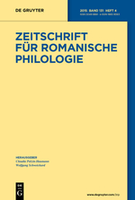
ZEITSCHRIFT FUR ROMANISCHE PHILOLOGIE
Bridging Historical Insights with Modern Literary DiscourseZEITSCHRIFT FUR ROMANISCHE PHILOLOGIE, published by Walter de Gruyter GmbH, stands as a prominent peer-reviewed journal dedicated to the fields of Linguistics, Literature, and Literary Theory. Established in 1877 and continuing its legacy to the present day, this esteemed journal offers a platform for comprehensive scholarship that explores the intricacies of Romance languages and their literary heritage. With a notable Q1 ranking in Literature and Literary Theory and a Q2 ranking in Linguistics and Language, it has secured its place among leading resources in the humanities. Researchers, educators, and students benefit from its rich historical context and current contributions to the understanding of Romance languages and literature. Though currently not available as Open Access, the journal prioritizes the dissemination of high-quality research, making significant strides in fostering academic dialogue and advancement. Its address at Genthiner Straße 13, Berlin, Germany, situates it in a hub of scholarly activity, bridging the past with contemporary literary discourse.
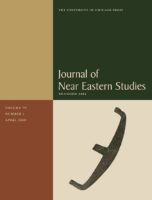
JOURNAL OF NEAR EASTERN STUDIES
Connecting Cultures through Rigorous Scholarly DiscourseJournal of Near Eastern Studies (ISSN: 0022-2968; E-ISSN: 1545-6978), published by University of Chicago Press, stands as a cornerstone of academic discourse in the fields of Archaeology, Cultural Studies, and Linguistics and Language. With a prestigious track record that has evolved since its inception and spanning converged publication years from 1968 to 2024, this journal holds an impressive Q1 ranking in Cultural Studies and Linguistics and Language, and a solid Q2 ranking in Archaeology and Arts and Humanities as of 2023. Despite not offering open access, it is widely regarded for its rigorous peer-reviewed articles that contribute significantly to the understanding of Near Eastern history, culture, and languages. The journal's sustained recognition in Scopus rankings, including a notable 30th rank out of 173 in Arts and Humanities, ensures it remains an essential resource for researchers, academics, and students dedicated to exploring the rich tapestry of the Near East. With its base in Chicago, USA, the Journal of Near Eastern Studies continues to foster interdisciplinary collaboration and scholarly excellence.

Archiv Orientalni
Cultivating Knowledge in the Heart of Cultural StudiesArchiv Orientalni, established by the Oriental Institute of the Czech Academy of Sciences, is a distinguished journal dedicated to the rich fields of cultural studies and history. With its ISSN of 0044-8699, this journal plays a significant role in disseminating research that explores the complexities of Oriental studies and historical narratives. Based in the Czech Republic, it has completed its converged years from 2009 to 2024, showcasing a commitment to academic rigor and scholarly contribution. Although currently classified in Q4 for Cultural Studies and Q3 for History, the journal remains a valuable resource for researchers and students alike, looking to explore under-represented aspects within these realms. By providing insightful analyses and fostering academic dialogue, Archiv Orientalni aims to enhance understanding of diverse cultural heritages and historical contexts, appealing to a global audience dedicated to advancing knowledge in these essential domains.
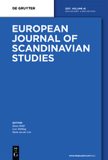
European Journal of Scandinavian Studies
Illuminating linguistic diversity and literary depth.European Journal of Scandinavian Studies is an esteemed journal published by Walter de Gruyter GmbH, dedicated to advancing scholarship in the fields of Cultural Studies, Linguistics and Language, and Literature and Literary Theory. Since its inception in 2010, the journal has been a pivotal platform for researchers and scholars, showcasing cutting-edge research and critical discussions pertaining to Scandinavian languages and cultures. With an ISSN of 2191-9399 and an E-ISSN of 2191-9402, the journal emphasizes accessibility to impactful academic work, despite its current non-open access model. While the journal is categorized within the Q4 quartile for Cultural Studies and Linguistics/Language, it has shown notable potential in ranking higher in its specialized domains, fostering a growing community of researchers invested in Scandinavian studies. The journal's office is located in Berlin, Germany, further enriching its European scholarly context. As it continues to evolve, the European Journal of Scandinavian Studies serves as a vital resource for academics seeking to engage deeply with the multifaceted aspects of Scandinavian culture and linguistics.
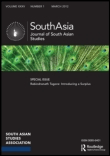
SOUTH ASIA-JOURNAL OF SOUTH ASIAN STUDIES
Advancing Scholarly Discourse on South Asian DynamicsSOUTH ASIA-JOURNAL OF SOUTH ASIAN STUDIES, published by Routledge Journals, Taylor & Francis Ltd, stands as a seminal platform for scholarly discourse in South Asian studies. With a proud history dating back to 1971, the journal provides a comprehensive examination of the region's multifaceted cultural, historical, and socio-political dynamics. Renowned for its rigorous peer-reviewed articles, it is listed in the prestigious Q1 category in Cultural Studies and History and has garnered respect across the social sciences, indicated by its competitive rankings in Development and Sociology and Political Science. Although it does not currently offer open access, the journal's influence is evident, boasting an impressive impact in its fields as indicated by its Scopus rankings, with a noteworthy 88th percentile in History. Targeted towards researchers, professionals, and students alike, SOUTH ASIA-JOURNAL OF SOUTH ASIAN STUDIES is essential for anyone seeking to deepen their understanding of South Asian complexities and contribute to ongoing academic conversations.

GLOTTA-ZEITSCHRIFT FUR GRIECHISCHE UND LATEINISCHE SPRACHE
Connecting Scholars Through Timeless LanguageGLOTTA-ZEITSCHRIFT FUR GRIECHISCHE UND LATEINISCHE SPRACHE, published by Vandenhoeck & Ruprecht GmbH & Co KG, stands as a pivotal academic journal within the field of Classics and Linguistics, demonstrating a strong commitment to advancing scholarly discourse surrounding the Greek and Latin languages. With a respectable Scopus ranking placing it in the top 77th percentile for Classics, this journal facilitates the dissemination of high-quality research and insights relevant to linguists, philologists, and historians alike. The journal operates without an open access model, ensuring its niche scholarship remains exclusive yet profoundly impactful. The HIndex is indicative of its longstanding influence, with the journal traces its roots back to its inception, with weighted contributions across several pivotal years. Furthermore, the journal's current standing—positioned in the Q2 quartile for Classics and Q3 quartile for Linguistics—reflects its thriving relevance and aspiration towards academic excellence, offering a significant platform for the exchange of ideas within the global scholarly community. Researchers, professionals, and students are encouraged to engage with the journal's contributions, as it consistently reflects the evolving dialogue in the study of ancient languages.

Cartagine-Studi e Ricerche
Exploring the depths of archaeology and classics.Cartagine-Studi e Ricerche is a distinguished academic journal published by UNIV STUDI CAGLIARI, dedicated to advancing the fields of Archaeology, Classics, and History. With an Open Access format since its inception in 2016, this journal ensures that scholarly research is freely available to a global audience, fostering knowledge dissemination and collaboration among researchers, professionals, and students. Based in Italy, it occupies a vital place in the academic community, holding a Q3 ranking in each of its categories for 2023, showcasing its relevance and impact in the disciplines it covers. Scopus rankings further validate its quality, with impressive percentiles reflecting its significant contributions to the landscape of arts and humanities. Spanning converged years from 2019 to 2024, Cartagine-Studi e Ricerche serves as a crucial resource for those engaged in the study of ancient cultures and historical contexts, inviting innovative research and critical discussions that shape our understanding of the past.

ZEITSCHRIFT DER DEUTSCHEN MORGENLANDISCHEN GESELLSCHAFT
Bridging Cultures Through Rigorous Academic InquiryZEITSCHRIFT DER DEUTSCHEN MORGENLANDISCHEN GESELLSCHAFT is a distinguished academic journal published by Harrassowitz Verlag, prominently situated in Germany. With ISSN 0341-0137, it serves as a critical forum for scholars engaged in the fields of Cultural Studies and History. The journal has carved out its niche in the academic community with its Q3 ranking in both disciplines as of 2023, reflecting its commitment to fostering in-depth research and discussions that illuminate various historical and cultural contexts. Despite its current positioning in the lower quartiles, the journal has a specific focus on the interaction between Eastern and Western cultures, thus appealing to researchers, professionals, and students alike who are keen on exploring new insights in a globalized world. While the journal is not open access, it remains an essential resource for those aiming to deepen their understanding of cultural interrelations and historical developments from a German perspective. For further inquiries, the journal can be contacted at its address: Kreuzberger Ring 7B-D, Wiesbaden 65174, Germany.